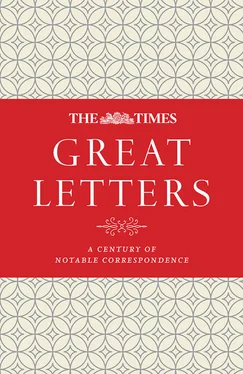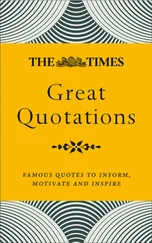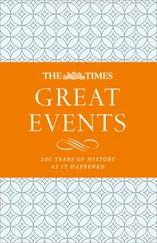I am, Sir, your obedient servant,
G. LESTRADE, ex-lnspector, Metropolitan Police.
THUNDERING
1914–19
Mr. Backhouse’s gift to Bodleian
7 January 1914
Sir, I read with interest the illuminating account in your issue of December 2 of the Chinese library presented by me to the Bodleian, and thank the writer for correcting an error into which I had carelessly fallen respecting one of the Sung editions, the “Ku Chin Chi Yao.” My reason for assigning some date prior to 1085 was that a character identical with the tabooed personal name of an Emperor who reigned after that year was not written with the customary omission of a stroke as a mark of respect. This rule was rigidly enforced under the Sungs, as in later dynasties, and its contravention can only have been due to carelessness on the part of the printer, as your article shows conclusively that the earlier date which I had assigned cannot be correct. It appears from a catalogue which I have consulted that the “editio princeps” of this work was published in 1260, the first year of the Ching Ting of the Southern Sung dynasty, and also the year of Kublai’s accession to the northern throne. My belief is that the copy in the Bodleian is the first edition, so that it should be assigned to the Sung and not to the Yuan. Several reproductions of Sung printing which I have seen show the cramped style of printing which your article rightly mentioned as characteristic also of the Yuan period.
In reference to another Sung print in the collection you allude to the light shade of the paper; I do not think that this is exceptional in books of that date. I have before me a Sung edition of the collection known as “Wen Hsuan” from the library of the eminent Viceroy and collector, Tuan Fang, who was murdered by his troops in Szuch’uan during the revolution. This work is mentioned in his catalogue as indisputably Southern Sung, and in this case also the paper is almost white. I may claim some knowledge of the Sung print, “Works of Tu Fu,” now at Cambridge, to which your article also refers, as it was formerly in my collection. Personally I believe it to date from about 1230, but a former Tartar general of Canton, Feng Shan, who was an authority on ancient prints, used to tell me that its date is early Yuan, say about 1290. He denied that the colour of the paper was a conclusive test, especially in view of the skilful “doctoring” of the old Chinese prints.
I am, Sir, &c.,
EDMUND BACKHOUSE
Sir Edmund Backhouse (as he later became) was regarded for much of the 20th century as one of the greatest European scholars of China, where he lived for decades until his death in 1944. His reputation stemmed in part from the inside knowledge of the Imperial court which he supplied to The Times’s correspondent in Peking. This letter dates from the period when the newspaper was starting to group all letters to it onto
a single page and records Backhouse’s donation of eight tons of historic Chinese manuscripts to the Bodleian Library, Oxford. Only in 1973 were the provenance of
many of these thrown into doubt when Backhouse’s biographer Hugh Trevor-Roper unmasked him as a liar, fraudster and fantasist who had wildly exaggerated his expertise and claims of influence.
* * * * * * *
The Redress of Crying Shames
28 February 1914
Sir, I am moved to speak out what I and, I am sure, many others are feeling. We are a so-called civilized country: we have a so-called Christian religion: we profess humanity. We have a Parliament of chosen persons, to each of whom we pay £400 a year, so that we have at last some right to say: “Please do our business, and that quickly.” And yet we sit and suffer such barbarities and mean cruelties to go on amongst us as must dry the heart of God. I cite a few only of the abhorrent things done daily, daily left undone; done and left undone, without shadow of doubt, against the conscience and general will of the community:
Sweating of women workers.
Insufficient feeding of children.
Employment of boys on work that to all intents ruins their chances in after-life — as mean a thing as can well be done.
Foul housing of those who have as much right as you and I to the first decencies of life.
Consignment of paupers (that is of those without money or friends) to lunatic asylums on the certificate of one doctor, the certificate of two doctors being essential in the case of a person who has money or friends.
Export of horses worn-out in work for Englishmen — save the mark! Export that for a few pieces of blood-money delivers up old and faithful servants to wretchedness.
Mutilation of horses by docking, so that they suffer, offend the eye, and are defenceless against the attacks of flies that would drive men, so treated, crazy.
Caging of wild things, especially wild song-birds, by those who themselves think liberty the breath of life, the jewel above price.
Slaughter for food of millions of creatures every year by obsolete methods that none but the interested defend.
Importation of the plumes of ruthlessly slain wild birds, mothers with young in the nest, to decorate our gentlewomen.
Such as these — shameful barbarities done to helpless creatures we suffer amongst us year after year. They are admitted to be anathema; in favour of their abolition there would be found at any moment a round majority of unfettered Parliamentary and general opinion. One and all they are removable, and many of them by small expenditure of Parliamentary time, public money, and expert care. Almost any one of them is productive of more suffering to innocent and helpless creatures, human or not, and probably of more secret harm to our spiritual life, more damage to human nature, than for example, the admission or rejection of Tariff Reform, the Disestablishment or preservation of the Welsh Church. I would almost say than the granting or non-granting of Home Rule — questions that sop up ad infinitum the energies, the interest, the time of those we elect and pay to manage our business. And I say it is rotten that, for mere want of Parliamentary interest and time, we cannot have manifest and stinking sores such as these treated and banished once for all from the nation’s body. I say it is rotten that due time and machinery cannot be found to deal with these and other barbarities to man and beast, concerning which, in the main, no real controversy exists. Rotten that their removal should be left to the mercy of the ballot, to private members’ Bills, liable to be obstructed; or to the hampered and inadequate efforts of societies unsupported by legislation.
Rome, I know, is not built in a day. Parliament works hard, it has worked harder during these last years than ever perhaps before — all honour to it for that. It is an august Assembly of which I wish to speak with all respect. But it works without sense of proportion, or sense of humour. Over and over again it turns things already talked into their graves; over and over again listens to the same partisan bickerings, to arguments which everybody knows by heart, to rolling periods which advance nothing but those who utter them. And all the time the fires of live misery that could, most of them, so easily be put out, are raging and the reek thereof is going up.
It is I, of course, who will be mocked at for lack of the senses of proportion and humour in daring to compare the Home Rule Bill with the caging of wild song birds. But if the tale of hours spent on the former since the last new thing was said on both sides be set against the tale of hours not yet spent on the latter, the mocker will yet be mocked.
I am not one of those who believe we can do without party, but I do see and I do say that party measures absorb far too much of the time that our common humanity demands for the redress of crying shames. And if, Sir, laymen see this with grief and anger, how much more poignant must be the feeling of members of Parliament themselves, to whom alone remedy has been entrusted!
Читать дальше












